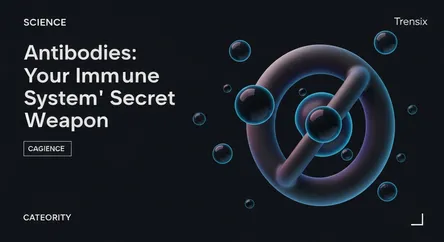Science
Antibodies: Your Immune System's Secret Weapon

Discover antibodies, the Y-shaped proteins produced by your immune system to identify and neutralize foreign invaders like viruses and bacteria.
What is it?
An antibody, or immunoglobulin, is a Y-shaped protein produced by the immune system to fight foreign invaders like viruses and bacteria. When a harmful substance, called an antigen, enters the body, specialized white blood cells (B cells) create antibodies designed to bind specifically to that antigen. This binding action either neutralizes the threat directly or 'tags' it for destruction by other immune cells, forming a critical part of the body's adaptive defense system.
Why is it trending?
Antibodies have gained massive public attention due to their central role in the COVID-19 pandemic, with frequent discussions about immunity, vaccine efficacy, and antibody testing. Beyond the pandemic, advances in medicine have highlighted their therapeutic potential. Monoclonal antibody treatments, which are lab-created antibodies, are increasingly used to target specific cells, offering revolutionary treatments for cancer, autoimmune disorders, and other diseases, keeping them at the forefront of medical news.
How does it affect people?
Antibodies are fundamental to everyday health. They are the reason we develop long-term immunity after an infection or vaccination, protecting us from future illness. This 'immunological memory' is the principle behind vaccines. Medically, they are vital for diagnostics, like pregnancy tests, and for life-saving therapies. When the system errs and creates autoantibodies, it can lead to autoimmune diseases. From preventing polio to treating cancer, antibodies directly impact disease prevention and patient care globally.